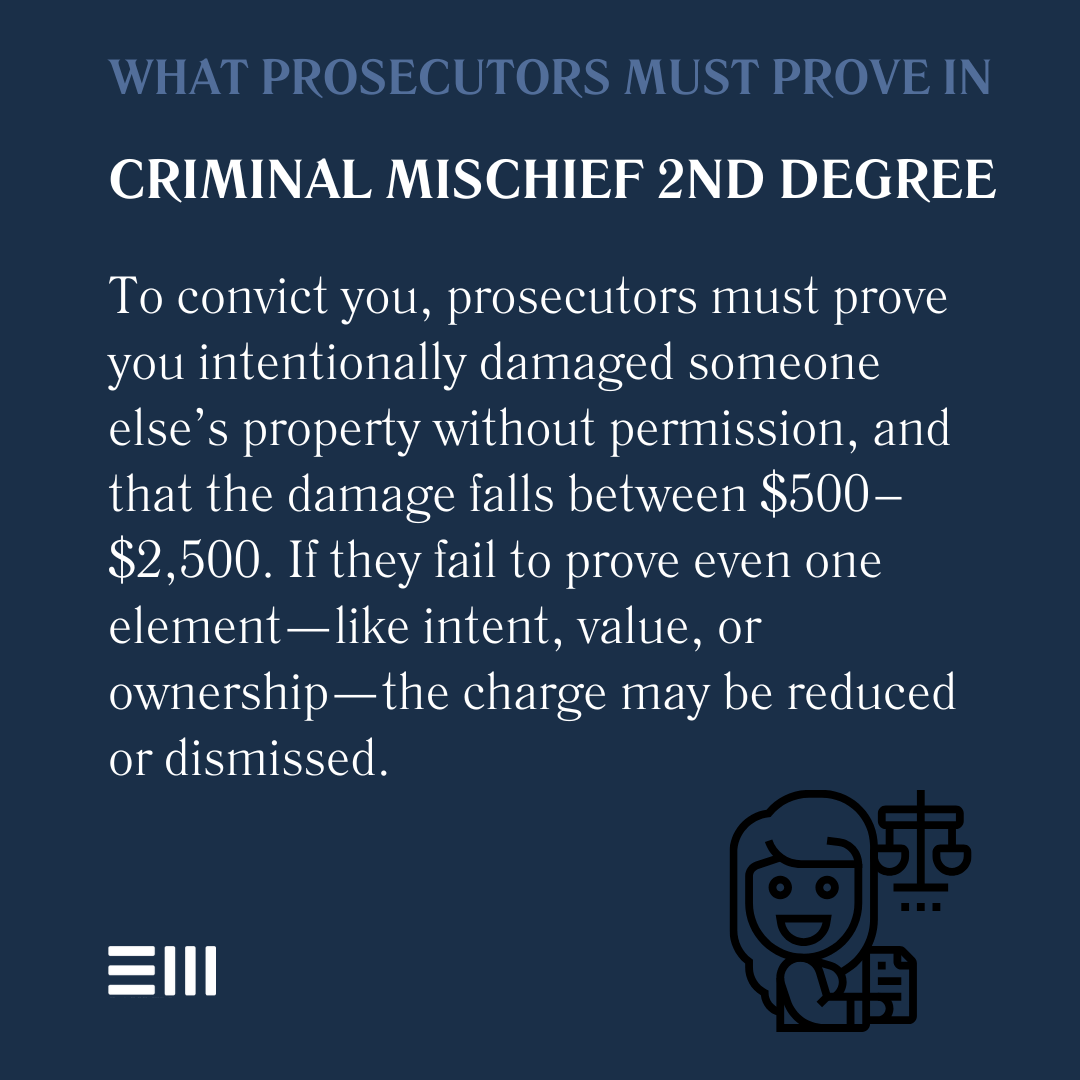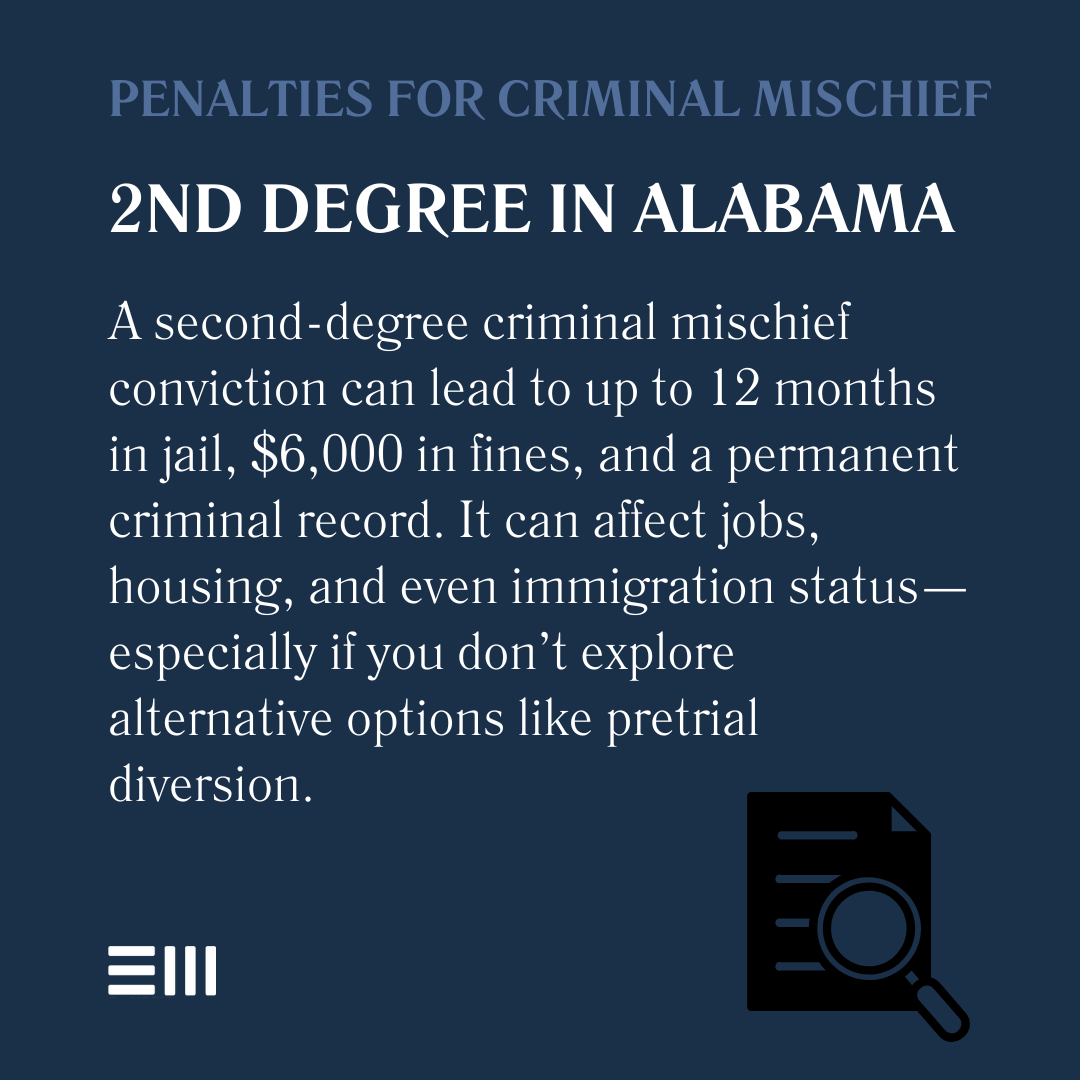One moment of poor judgment—a spray-painted wall, a broken window during an argument, or damaged property after a disagreement—can suddenly thrust you into Alabama's criminal justice system, facing second-degree criminal mischief charges.
While classified as a misdemeanor, this offense carries penalties that can shadow your future long after the incident: up to a year in county jail, substantial fines reaching $6,000, and a permanent criminal record that follows every job application and housing request for years to come.
Understanding Criminal Mischief 2nd Degree in Alabama
Criminal mischief in the second degree represents a specific property crime category under Alabama law. According to Alabama Code § 13A-7-22, this charge applies when someone intentionally damages property belonging to another person, with damage valued between $500 and $2,500.
The classification focuses on the monetary value of damaged property rather than the method of damage, making proper property valuation central to determining the appropriate charge level.
This offense differs significantly from first-degree criminal mischief (damage exceeding $2,500 or involving dangerous means) and third-degree criminal mischief (damage under $500).
Second-degree charges occupy the middle ground as Class A misdemeanors under Alabama's criminal code.
While not felony-level, these charges still carry serious consequences, including jail time, probation, restitution requirements, and collateral consequences affecting employment, housing, and educational opportunities.
Elements Prosecutors Must Prove in Criminal Mischief Cases
For a successful conviction on criminal mischief charges, Alabama prosecutors must establish specific elements beyond a reasonable doubt. Understanding these required elements reveals potential defense strategies that may apply to your case.
The prosecution must demonstrate:
- The defendant knowingly and intentionally damaged property;
- The property belonged to another person or entity;
- The damage occurred without the owner's permission;
- The value of damaged property falls between $500-$2,500;
- The defendant acted with specific intent to damage the property;
- The damage occurred within the statute of limitations period;
- The Alabama court has proper jurisdiction over the case; and
- The property valuation methodology meets legal standards.
The burden of proof rests entirely with the prosecution to establish each element. Failure to convincingly prove any single element can result in charge dismissal, reduction to a lesser offense, or acquittal at trial.
This burden requirement creates multiple opportunities for effective defense strategies focused on challenging the evidence supporting these essential elements.
Potential Penalties for Criminal Mischief 2nd Degree
Second-degree criminal mischief carries significant penalties under Alabama law that extend beyond immediate punishment to long-term consequences. Understanding the full range of potential outcomes helps defendants make informed decisions about their cases.
Conviction consequences may include:
- Up to 12 months in county jail;
- Fines reaching $6,000 plus court costs;
- Mandatory restitution to the property owner;
- Probation with regular reporting requirements;
- Community service hours;
- Anger management or counseling programs;
- Permanent criminal record affecting background checks;
- Potential professional license impacts;
- Possible immigration consequences for non-citizens; and
- Enhanced penalties for subsequent property crime convictions.
First-time offenders may qualify for alternative sentencing options, including pretrial diversion, conditional discharge programs, or youthful offender status for younger defendants. These alternatives often focus on rehabilitation rather than punishment, potentially allowing case dismissal upon successful program completion.
However, eligibility depends on various factors, including criminal history, case circumstances, and the specific policies of the prosecuting jurisdiction.
Effective Defense Strategies for Criminal Mischief Charges
Numerous defense approaches can be effective against second-degree criminal mischief charges, depending on the case specifics.
Experienced defense attorneys evaluate all available evidence to identify the most promising strategies for each unique situation.
Potential defense approaches include:
- Challenging property valuation methods and conclusions;
- Disputing ownership of the allegedly damaged property;
- Demonstrating lack of intent to cause damage;
- Identifying mistaken identity or alibi evidence;
- Asserting permission or right to modify the property;
- Questioning evidence collection procedures and chain of custody;
- Investigating constitutional violations during arrest or evidence gathering;
- Exploring causation issues (property damaged by other means);
- Negotiating civil settlements with property owners; and
- Presenting evidence of property condition before alleged damage.
The specific circumstances surrounding your case determine which defenses offer the strongest protection.
Early case investigation preserves critical evidence that might otherwise disappear, including surveillance footage, witness statements, or documentation of pre-existing property damage. This evidence collection process forms the foundation for building effective defense strategies tailored to your unique situation.
Navigating the Criminal Justice Process
Understanding the typical progression of criminal mischief cases helps defendants prepare for each stage while making informed decisions about their defense approach. The process includes several distinct phases from initial charges through case resolution.
After arrest or citation, defendants typically experience:
- Initial appearance and bail determination;
- Arraignment with formal charge reading and plea entry;
- Discovery phase exchanging evidence between prosecution and defense;
- Pretrial motions addressing evidence and procedural issues;
- Plea negotiation discussions with prosecutors;
- Pretrial conferences establishing case timelines;
- Trial proceedings if plea agreements aren't reached;
- Sentencing hearings following conviction; and
- Potential appeals for procedural or legal errors.
Each stage presents distinct opportunities for favorable outcomes through strategic legal approaches. Early intervention often yields the best results, as prosecutors have maximum flexibility before investing substantial resources in case preparation.
This timing advantage makes prompt legal consultation essential following any criminal mischief arrest or investigation.
Frequently Asked Questions About Criminal Mischief 2nd Degree in Alabama
Those facing criminal mischief charges often have specific questions about their legal situation.
Here are answers to the most common questions about second-degree criminal mischief charges in Alabama.
Can Criminal Mischief 2nd Degree be Expunged from My Record?
Under Alabama's expungement laws, Class A misdemeanors, including second-degree criminal mischie,f may qualify for expungement under specific circumstances. Generally, charges resulting in dismissal, acquittal, or successful completion of diversion programs have the strongest expungement eligibility.
Convictions require waiting periods, typically five years after completing all sentence requirements, with no subsequent charges during that period. The expungement process involves court filing fees, supporting documentation, and sometimes a hearing before a judge determines whether to grant the expungement request.
What if I Didn't Know the Value of the Property I Damaged?
Lack of knowledge about property value typically doesn't constitute a valid defense since criminal mischief focuses on intent to damage rather than awareness of monetary value. However, property valuation disputes represent legitimate defense strategies.
If prosecutors cannot establish damage values within the $500-$2,500 range through credible evidence, charges may be reduced to third-degree criminal mischief or dismissed entirely. Expert property assessments and documentation of pre-existing conditions often prove valuable in challenging prosecution valuation claims.
How Does Criminal Mischief Differ from Vandalism?
In Alabama, "criminal mischief" represents the formal legal term for what many informally call vandalism. Both terms describe property damage offenses, but criminal mischief appears in the actual statutory language and legal documents.
While media reports and casual conversations might reference vandalism charges, court documents will specifically reference criminal mischief statutes. The distinction matters primarily for legal research and understanding the specific elements prosecutors must prove under Alabama's criminal code.
Protect Your Rights and Future Today
A criminal mischief charge doesn't have to define your future. With knowledgeable legal guidance, many defendants successfully resolve these cases through charge reductions, diversion programs, or dismissals that minimize long-term consequences.
Our experienced criminal defense attorneys understand Alabama's property crime laws and how to identify weaknesses in prosecution cases. We've helped hundreds of clients facing criminal mischief charges achieve favorable outcomes through strategic defense approaches tailored to their unique circumstances.
Contact Baxley Maniscalco today for a confidential consultation about your criminal mischief case.


